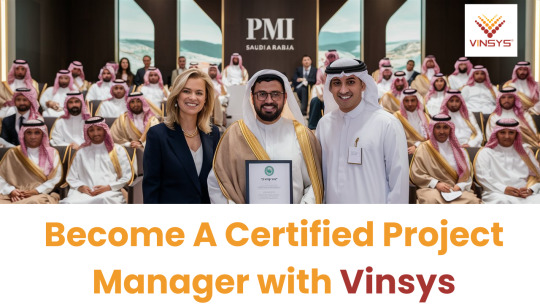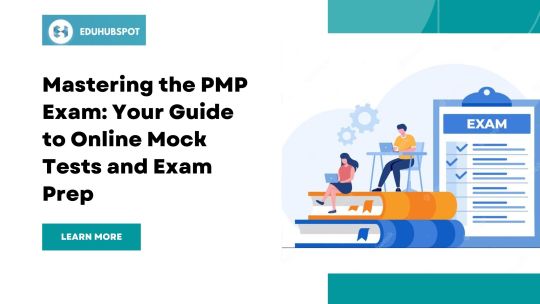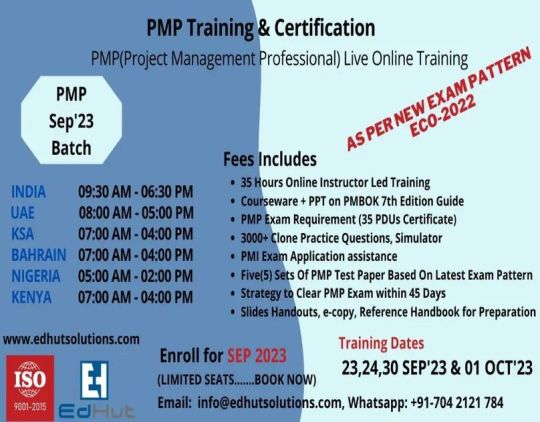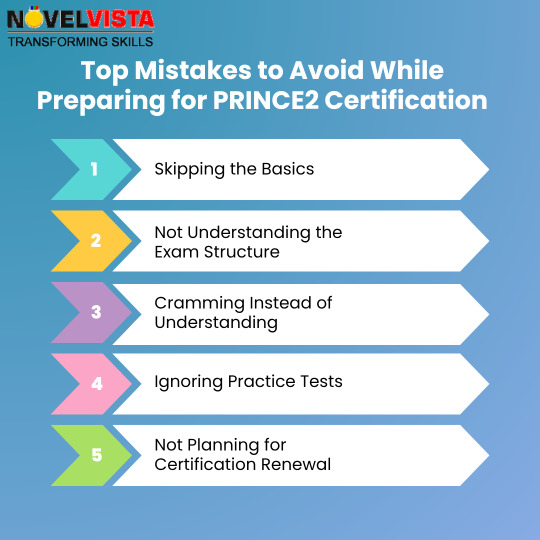#PMP exam preparation
Explore tagged Tumblr posts
Text
Creating an Effective Study Plan for the PMP Exam
Studying for the Project Management Professional (PMP) exam takes more than book reading. A study plan will keep you focused, ensure that you cover all topics required, and instill confidence to pass the exam on the first attempt.
Why a Study Plan Matters The PMP exam tests a broad range of project management principles, including the five process groups and ten knowledge areas defined in the PMBOK Guide. Without a plan, it's easy to be overwhelmed or overlook key topics.
Steps to Create Your PMP Study Plan Assess Your Starting Point Start by determining how much you know and experience. Determine your strengths and weaknesses.
Set a Realistic Timeline Schedule your exam date and work backwards to create weekly or daily study objectives. The vast majority of candidates study for 2 to 3 months, but adapt to your schedule.
Obtain Study Materials Obtain necessary resources such as the PMBOK® Guide, PMP study books, online training, and simulation exams. Good materials save time and enhance learning.
Split Up the Topics Break the syllabus into reasonable sections, like process groups (Initiating, Planning, Executing, etc.) or knowledge areas (Scope, Time, Cost, Risk, etc.). Tackle one area at a time.
Schedule Regular Study Sessions Regularity is essential. Set aside specific time each day or week, and adhere to it to gain momentum.
Include Practice Tests Self-test periodically with mock tests to detect gaps and enhance test-taking ability. Practice under simulated exam conditions to develop stamina.
Study Groups or Forums Discuss tough topics with fellow candidates, exchange resources, and motivate each other.
Review and Relax Plan Schedule some time at the end for general review and recreation. Rest and avoid burnout by alternating study with breaks.
Success Tips Memorize formulas and terms using flashcards or apps.
Emphasis on concept understanding and not rote learning.
Monitor your progress and make adjustments in your plan accordingly.
Final Thoughts The right study plan makes PMP exam preparation an attainable goal. By being committed and with the correct strategy, you can learn the concepts by heart and step into the exam confident and prepared.
Plan well, study smart, and pass your PMP!
0 notes
Text
How To Improve Project Outcomes
Looking for ways to improve your project outcomes and efficiency? Frequent iterations can make a huge difference!
Explore our latest article and uncover how this project management technique fosters innovation and keeps teams aligned with stakeholder needs.

We dive into its historical evolution, key benefits, and real-world examples that highlight its effectiveness. 👉 https://www.advisedskills.com/blog/project-management/how-frequent-iterations-improve-project-outcomes
Take the next step in your career. Register now for the PMI® Authorized PMP® Exam Preparation course!
#ProjectManagement #Agile #Iterations #ContinuousImprovement #PMPCertification #Leadership #AdvisedSkills #PMPExamPreparation
1 note
·
View note
Text

Join Vinsys Arabia for premier PMP certification training in Saudi Arabia. Our comprehensive project management courses and experienced instructors prepare you to excel in your career and achieve PMP certification.
#PMP Certification#PMP Certification in Saudi Arabia#Vinsys Arabia#PMP exam Preparation#PMP Training
1 note
·
View note
Text
Best Project Management Courses in Australia
project management in the dynamic world choosing the right course and institution is crucial for a successful career. Australia stands out as a prime destination for pursuing project management courses due to its world-renowned universities, industry-focused curriculum, and international recognition.
In today's competitive job market, having a solid foundation in project management is a valuable asset. In Australia, the options for project management courses are abundant, offering a unique blend of academic excellence and practical industry relevance.

Why Choose Australia for Project Management Courses
World-Renowned Institutions
Australia boasts globally recognized universities that consistently rank high in international standings. These institutions prioritize quality education, ensuring students receive the best training in project management.
Industry-Relevant Curriculum
The curriculum of project management courses in Australia is designed in collaboration with industry experts. This ensures that students acquire the skills and knowledge demanded by employers, making them well-prepared for the professional landscape.
International Recognition
Australian project management courses are globally acknowledged and respected. Graduates often find themselves equipped with an internationally recognized qualification, opening doors to career opportunities on a global scale.
Top Universities Offering Project Management Courses
Deakin University
Known for its commitment to excellence, Deakin University offers a diverse range of project management courses. With esteemed faculty members and cutting-edge facilities, students receive a comprehensive education.
Australian National University
Australian National University stands out for its unique features in project management education. The institution emphasizes hands-on learning and showcases success stories of alumni who have made significant contributions to the field.
Online vs. On-Campus Learning
Advantages of Online Learning
Online project management courses provide flexibility for working professionals, allowing them to balance education with existing commitments. The accessibility of resources and the ability to learn at one's own pace are additional benefits.
Benefits of Traditional On-Campus Courses
On-campus learning offers a more immersive experience, fostering direct interaction with faculty and peers. The collaborative environment enhances networking opportunities and facilitates face-to-face discussions.
Hybrid Options
Many institutions in Australia now offer hybrid courses, combining the flexibility of online learning with the advantages of on-campus engagement. This provides students with a personalized learning experience.
Specialized Project Management Courses
Agile Project Management
With the increasing adoption of agile methodologies, specialized courses in agile project management cater to the growing demand for professionals skilled in managing dynamic projects.
IT Project Management
Australia's tech industry is booming, and IT project management courses focus on the specific challenges and opportunities within this sector.
Construction Project Management
For those inclined towards construction and infrastructure projects, specialized courses in construction project management provide a targeted curriculum.
Industry Partnerships and Internship Opportunities
Collaborations with Leading Industries
Top Australian universities often collaborate with leading industries, providing students with exposure to real-world projects and industry practices.
Internship Programs for Practical Experience
Internship opportunities complement theoretical knowledge, offering students a chance to apply their skills in a practical setting. This hands-on experience is invaluable for future success in project management.
Student Testimonials
Success Stories of Past Students
Real success stories from project management graduates highlight the positive impact of their education on career growth and opportunities.
Positive Impact on Career Growth
Students often share how their project management courses in Australia have directly contributed to their career growth, emphasizing the practical skills gained during their studies.
Accreditation and Certification
Importance of Accreditation
Accreditation ensures that project management courses meet industry standards. Prospective students should prioritize accredited institutions to guarantee the quality of education received.
Recognized Certifications in Project Management
In addition to academic qualifications, obtaining recognized certifications enhances a project manager's credentials. Australia provides opportunities for students to pursue industry-recognized certifications alongside their academic studies.
Affordability and Scholarships
Tuition Fees Comparison
A crucial consideration for many students is the affordability of education. Comparing tuition fees helps prospective students make informed decisions based on their budget and financial resources.
Scholarship Opportunities
Australian universities offer various scholarships, easing the financial burden for deserving students. Exploring available scholarships is essential for those seeking financial assistance.
Future Trends in Project Management
Emerging Technologies
The future of project management is closely tied to technological advancements. Courses in Australia adapt to these trends, ensuring students are well-versed in the latest tools and methodologies.
Evolving Job Market
As the job market evolves, project managers need to stay ahead of industry trends. Australian courses prepare students for the dynamic nature of project management careers.

How to Choose the Best Project Management Course
Factors to Consider
Choosing the right project management course involves considering factors such as course structure, faculty expertise, and industry connections. Prospective students should align their choices with their career goals.
Personalized Career Goals
Tailoring education to personal career goals is essential. Australian institutions offer a variety of courses, allowing students to specialize in areas that align with their interests and aspirations.
Success Stories of Project Management Graduates
Notable Individuals Who Excelled After Completing Courses
Highlighting success stories of individuals who have excelled in their careers post-graduation inspires confidence in prospective students.
FAQs
What is project management certification, and why is it important? Project management certification validates an individual's expertise in effectively managing projects. It is essential for career advancement and signifies a commitment to professionalism in project management.
Which project management certification is right for me? The right certification depends on your career goals, industry, and preferences. PMP is widely recognized, but options like CAPM or Agile certifications might suit entry-level professionals or those in specific industries better.
How do I prepare for a project management certification exam? Exam preparation involves a combination of self-study, practice exams, and, in some cases, formal training. Understanding the exam structure and content is crucial for success.
What are the eligibility criteria for project management certification? Eligibility criteria vary for each certification. Ensure you meet the specific requirements, such as education and work experience, before applying.
How long does it take to obtain project management certification? The time required depends on factors like the chosen certification, individual study pace, and prior experience. Plan your preparation timeline accordingly.
Are project management certifications only for IT professionals? No, project management certifications are applicable across various industries, including healthcare, construction, finance, and more.
#Project management training#Certification programs#PMP exam preparation#ScrumMaster certification#PRINCE2 certification benefits
0 notes
Text
Maintaining Motivation During PMP Exam Prep: Overcoming Burnout and Stress

Introduction
Preparing for the Project Management Professional (PMP) exam is a significant endeavor that demands dedication, commitment, and a substantial amount of time and effort. As you navigate through the extensive study materials and rigorous practice exams, it's not uncommon to face moments of burnout and stress. However, maintaining motivation during your PMP exam prep is crucial to your success. In this article, we will explore effective strategies to overcome burnout and stress and keep your motivation intact throughout your PMP journey.
Understanding the PMP Exam
Before diving into motivation strategies, it's important to understand the PMP exam's structure and demands. The PMP exam is known for its depth and breadth of content, covering various project management processes, methodologies, and concepts. The exam consists of 200 multiple-choice questions and is designed to evaluate your understanding of project management principles, your ability to apply them, and your decision-making skills.
Given the comprehensive nature of the PMP exam, it's natural to experience periods of burnout and stress. However, these feelings can be managed and even prevented with the right approach.
Setting Clear Goals and Expectations
One of the primary sources of stress during PMP exam preparation is not having clear goals and expectations. Before you begin your prep journey, define your goals. Understand why you want to become a PMP-certified professional and what benefits it will bring to your career. Having a compelling "why" will serve as your anchor during challenging times.
Additionally, set realistic expectations. Understand that preparing for the PMP exam is a marathon, not a sprint. It's essential to pace yourself and allocate enough time for studying and practice. Create a study schedule that aligns with your daily routine and responsibilities, ensuring a healthy work-study-life balance.
Effective Study Techniques
Motivation often wanes when your study sessions become monotonous or unproductive. To keep your motivation intact, adopt effective study techniques. Consider these strategies:
1. Active Learning: Instead of passively reading the material, engage actively with it. Take notes, ask questions, and discuss concepts with peers or study groups. Active learning enhances comprehension and retention.
2. Chunking: Break down the study material into smaller, manageable chunks. Focus on one topic or process group at a time. This approach makes learning more digestible and less overwhelming.
3. Practice Exams: Regularly take practice exams to simulate the actual testing environment. These tests help you identify weak areas, build confidence, and track your progress.
4. Mind Mapping: Create visual aids like mind maps to organize complex information. Visual representations can simplify complex concepts and make them easier to remember.
5. Teaching Others: Teaching the material to someone else can reinforce your understanding. It also allows you to see the subject matter from different perspectives.
Managing Burnout
Despite your best efforts, there may still be times when burnout creeps in. Recognizing the signs and addressing them promptly is crucial. Here's how to manage burnout:
1. Take Breaks: Overloading your brain with information can lead to burnout. Schedule regular breaks during your study sessions to relax and recharge.
2. Exercise: Physical activity can alleviate stress and boost your energy levels. Incorporate regular exercise into your routine to stay physically and mentally fit.
3. Healthy Diet: Proper nutrition plays a significant role in your cognitive function. Consume a balanced diet rich in brain-boosting nutrients like Omega-3 fatty acids and antioxidants.
4. Quality Sleep: Ensure you get enough sleep. Sleep is essential for memory consolidation and overall cognitive function.
5. Mindfulness and Relaxation Techniques: Practice mindfulness meditation or relaxation exercises to reduce stress and improve focus.
Make Sure to Check: Project Manager Jobs
Building a Support System
Motivation often thrives in a supportive environment. Surround yourself with individuals who understand your goals and can provide encouragement. Join PMP study groups or online communities where you can exchange ideas, ask questions, and share experiences. Having peers who are going through similar challenges can be incredibly motivating.
Visualizing Success
Visualization is a powerful tool to maintain motivation. Take a moment each day to visualize yourself passing the PMP exam with confidence. Picture the sense of accomplishment and the opportunities it will bring to your career. This positive reinforcement can help you stay focused and motivated.
Seeking Professional Help
In some cases, the stress and burnout associated with PMP exam preparation may become overwhelming. If you find yourself struggling to cope, don't hesitate to seek professional help. A counselor or therapist can provide guidance and strategies to manage stress and anxiety effectively.
Conclusion
Preparing for the PMP exam is undoubtedly a challenging journey, but it's one that can significantly enhance your career prospects in project management. To maintain motivation throughout the process, remember to set clear goals, manage your study techniques effectively, and recognize and address burnout when it arises. By adopting these strategies and seeking support from a community of like-minded individuals, you can overcome stress and burnout, ensuring that you stay motivated and successfully achieve your PMP certification. Ultimately, the key to success lies in your ability to persevere and stay committed to your goals.
0 notes
Text

#pmp online test#pmp mock exam online#pmp exam prep#pmp exam practice test#pmp mock tests#pmp practice exams#pmp mock exam#pmp simulator#project charter pmi#pmi project charter#pmp practice questions#pmp exam prep questions#pmp exam question#project management professional bootcamp#prepare for pmp#pmp boot camp online#best pmp online training#best pmp course#online pmp boot camp#best pmp prep course#best online pmp certification#best pmp training online#pmp certification bootcamp#best pmp certification training#pmpexammentor#pmpexambootcamp#bootcamp#pmpcertification#pgmp boot camp#pgmp bootcamp
0 notes
Text
PMP Exam Prep Guide: A Comprehensive Path to Ace the PMP Certification
Earning the Project Management Professional (PMP) certification is a significant achievement for project managers looking to validate their skills and advance their careers. The PMP certification, offered by the Project Management Institute (PMI), demonstrates your proficiency in project management methodologies, practices, and techniques. To successfully pass the PMP Exam Prep and achieve this prestigious certification, here's a comprehensive guide based on the experiences of those who have successfully navigated the process.
1. Understand the Exam Format and Content: The PMP exam is a rigorous test that assesses your knowledge and understanding of project management concepts. It consists of 180 multiple-choice questions, and you'll have 230 minutes to complete the exam. These questions are distributed across five domains: Initiating, Planning, Executing, Monitoring and Controlling, and Closing.
2. Eligibility Requirements: Before embarking on your PMP journey, ensure you meet the eligibility criteria set by PMI. This generally includes a combination of education and project management experience. Make sure you have the required documents and proof of your experience ready for the application process.
3. Study the PMBOK Guide: The Project Management Body of Knowledge (PMBOK) Guide is a fundamental resource for the PMP exam. It outlines the standard practices and principles of project management that the exam is based on. Make sure to thoroughly read and understand each knowledge area and process group.
4. Utilize Additional Study Materials: While the PMBOK Guide is crucial, it's beneficial to use additional study materials. Many successful PMP candidates recommend using study guides, online courses, practice exams, and flashcards. These resources provide different perspectives on the material and help reinforce your understanding.
5. Create a Study Plan: Organize your study efforts by creating a structured study plan. Determine how much time you can dedicate to studying each day or week and allocate specific topics for each study session. A well-structured plan ensures you cover all the material and reduces the chances of last-minute cramming.
6. Practice with Mock Exams: Practice exams are invaluable for simulating the real PMP Exam Prep experience. They help you understand the question format, manage your time effectively, and identify areas where you need more focus. Review both correct and incorrect answers to understand the reasoning behind them.
7. Focus on Exam Strategy: Time management is crucial during the exam. Some questions might take longer to solve than others. If you encounter a challenging question, consider flagging it and moving on to easier ones. This ensures you answer as many questions as possible within the allocated time.
8. Review and Revise: As the exam date approaches, allocate time for thorough review and revision. Go through your study materials again, especially focusing on areas where you struggled earlier. Don't just memorize; aim to understand the underlying concepts.
9. Manage Exam Stress: Exam anxiety is common, but managing stress is essential. Practice relaxation techniques such as deep breathing, meditation, or yoga. Adequate sleep, a balanced diet, and regular exercise contribute to your overall well-being and cognitive performance.
10. Exam Day Preparation: On the day of the exam, arrive early to the testing center, so you're not rushed. Bring necessary identification and any allowed reference materials. Stay calm, trust your preparation, and approach each question methodically.
11. Continuous Learning: After passing the PMP Exam Prep, your journey as a project management professional continues. Stay engaged with PMI, join relevant professional networks, attend workshops, and participate in continuing education to keep your skills sharp and stay updated on industry trends.
In Conclusion: Earning the PMP certification is a testament to your dedication and expertise as a project manager. Following this comprehensive guide, based on the experiences of successful PMP passers, will provide you with the knowledge, strategies, and confidence needed to ace the exam. Remember that preparation and perseverance are key, and with the right approach, you can proudly add PMP to your list of achievements.
0 notes
Text
Why PMP Certification Training is Essential for Project Managers in 2025

With the growth in technology, the demands of project managers to deliver their services with precision, efficiency, and strategic insight have tremendously increased. The heightening demand for skilled project management professionals is a result of businesses facing digital transformation, economic challenges, and factors affecting team dynamics. This is where PMP certification training is a game-changer. At MindCypress, we understand the changing dynamics of the industry and thus offer innovative training that helps professionals stay competitive and competent in 2025 and beyond.
Key Benefits of Project Management Professional Certification for Career Growth
Getting a Project Management Professional or PMP certification is not only an achievement but a skyrocket in one's career. The certification, which is recognized across the globe, guarantees a project manager's project leadership and direction in any industry using a standardized methodology alongside the Project Management Institute (PMI) framework.
Some of the benefits are:
Earning Potential is improved: PMI's recent salary surveys indicate that PMP-certified professionals earn much more, at least 20% over non-certified counterparts.
Global Recognition: It is now recognized and respected in more than 200 nations, making it a great asset for professionals trying to make it globally.
Career Free: PMP certification applies to all industries like IT, construction, healthcare, and finance, bringing a wider scope of mobility into job opportunities for most.
Stronger Professional Network: it allows connection with other PMP professionals for opportunities in learning, mentorship, and collaboration.
MindCypress PMP Certification Training is tailored for aspiring and experienced project managers, keeping in mind real-life scenarios, agile methodologies, and experiential learning.
How Project Management Training Enhances Efficiency and Leadership Skills
Besides gaining promotion opportunities, project management training imparts tools to improve the immediate performance of employees. Project managers are those bold individuals who expect the most from their crew and optimize value by their genius vision.
PMP training helps you in:
Strategic Planning & Execution: The PMP certification provides advanced techniques in planning, risk management tools, and quality control techniques, all of which will enable you to ensure project success from inception to end.
Improved Communication: You learn how to manage stakeholders, facilitate communication across departments, and accomplish team goals in alignment with organizational objectives.
Enhanced Leadership Abilities: PMP training hones skills in motivating teams, resolving conflicts, and managing performance—skills crucial when performing the task of leading a diverse team.
Data-Driven Decision Making: Learn the art of working out well-informed decisions through tools like Earned Value Management (EVM), Gantt Charts, and Agile dashboards.
MindCypress offers end-to-end project management training delivered by expert instructors, through interactive sessions, and with access to the latest study materials for full preparation to pass the PMP exam and perform well in your job.
Conclusion
In 2025, the business landscape will continue to reward those who are prepared, agile, and strategically skilled. Investing in PMP certification training through MindCypress is more than just a credential—it's a commitment to excellence, growth, and leadership in your profession. Whether you're an aspiring project manager or an experienced professional looking to elevate your career, PMP certification is a powerful step toward long-term success.
Choose MindCypress to guide you through your certification journey and position yourself as a top-tier project management professional in a world that values innovation, precision, and leadership.
Resource: https://mindcypress.com/blogs/project-management/why-pmp-certification-training-is-essential-for-project-managers-in-2025
2 notes
·
View notes
Text
Project Management Professional Certification With EduHubSpot.com
The Project Management Professional (PMP) certification is a globally recognized credential for project managers, showcasing expertise in managing projects effectively. Offered by PMI (Project Management Institute), the PMP validates skills in initiating, planning, executing, monitoring, and closing projects across industries. Achieving this certification boosts career opportunities and salary potential. For quality preparation, platforms like EduHubSpot.com provide comprehensive training materials, mock exams, and expert guidance tailored to PMP aspirants. Their resources ensure you gain a deep understanding of project management principles and ace the PMP exam confidently. Enroll with EduHubSpot.com to take the next step in your project management career!
1 note
·
View note
Text
Project Management Professional (PMP®) Certification Live Virtual
PMP Certification is like a gold standard certificate in project management offered by PMI. Our Training program is designed to provide 100% coverage of the PMP Exam Content Outline, as provided by PMI. The Project Management Professional Certification Prep course is designed to help professionals prepare for the PMP® certification exam.

2 notes
·
View notes
Text
PMP Certification Training Berlin Germany
Looking for PMP Certification Training Berlin Germany? Master of Project Academy offers flexible, self-paced online courses to help you pass the PMP exam on your first attempt. Gain expert knowledge of PMBOK Guide methodologies, real-world case studies, and essential project management skills. Whether you're in Berlin, Germany, or beyond, our training prepares you for career advancement. Enroll today and take the next step toward PMP certification success with a globally trusted training provider!
0 notes
Text
Top PMP Exam Questions Answered | May 2025 Practice Q&A with Explanations | PMPwithRay
youtube
Studying for the PMP exam? This video breaks down 5 important questions with explanations to help you get prepared. A great way to test your knowledge and boost your confidence before the exam! 🎥
0 notes
Text
Project Management Professional (PMP)
In today’s dynamic business environment, projects are growing in complexity and scale. Organizations need professionals who can lead, plan, execute, and deliver results effectively. That’s where a Project Management Professional (PMP) comes in.
The PMP certification, offered by the Project Management Institute (PMI), is a globally recognized credential that proves a project manager’s ability to manage projects efficiently, regardless of industry.
What is PMP?
The Project Management Professional (PMP) certification validates your competence to perform in the role of a project manager, leading and directing projects and teams. It is one of the most respected and sought-after certifications in the project management field.
The certification is based on the PMBOK® Guide (Project Management Body of Knowledge) and focuses on three core domains:
People – Emphasizing leadership and team management.
Process – Reinforcing technical aspects of managing projects.
Business Environment – Connecting projects to organizational strategy.
Why Get PMP Certified?
Global Recognition: PMP is respected across industries and borders, opening doors to international opportunities.
Higher Salary: PMP-certified professionals earn 20–25% more on average than non-certified peers.
Improved Skills: The certification process helps enhance leadership, risk management, scheduling, budgeting, and quality control skills.
Professional Credibility: PMP sets you apart as a credible and skilled leader capable of driving complex projects to success.
Eligibility Criteria
To apply for the PMP exam, candidates must meet one of the following sets of criteria:
Option 1:
A four-year degree
36 months of project management experience
35 hours of project management education or CAPM certification
Option 2:
A high school diploma or associate degree
60 months of project management experience
35 hours of project management education or CAPM certification
PMP Exam Structure
The PMP exam consists of 180 multiple-choice questions covering:
Project initiation
Planning
Execution
Monitoring and controlling
Closing
The exam duration is 230 minutes and includes two 10-minute breaks.
Steps to Become a PMP
Meet Eligibility Requirements
Apply on PMI.org
Schedule the Exam
Prepare with Study Materials and Practice Tests
Take and Pass the PMP Exam
Career Opportunities After PMP
PMP-certified professionals can work in various roles, including:
Project Manager
Program Manager
Project Coordinator
Operations Manager
Portfolio Manager
Product Manager
Industries hiring PMPs include IT, construction, engineering, manufacturing, healthcare, and government sectors.
Conclusion
Becoming a Project Management Professional (PMP) is not just a certification—it's a career investment. Whether you're seeking new job opportunities, promotions, or simply looking to enhance your skills, PMP opens the door to higher credibility, greater responsibility, and better salary.
If you're serious about taking your career to the next level, PMP is a certification worth pursuing.
0 notes
Text
Mastering the PMI-ACP Exam: Your Pathway to Success
Pathway to Success

Are you an aspiring Agile practitioner looking to take your career to new heights? The PMI-ACP (Project Management Institute Agile Certified Practitioner) certification might just be the key to unlocking exciting opportunities in the dynamic world of Agile project management. Whether you're an experienced professional or just starting your journey, the PMI-ACP certification can give you a competitive edge by validating your Agile skills and knowledge.
However, like any professional certification, preparing for the PMI-ACP exam requires thorough study, practice, and strategic preparation. One indispensable tool that can greatly enhance your chances of success is a PMI-ACP simulator. In this blog, we'll explore the benefits of using a PMI-ACP simulator, the significance of PMI-ACP questions, and the value of training programs like PMI-ACP boot camps and Camp PMI.
1. PMI-ACP Simulator: Your Ultimate Practice Partner
A PMI-ACP simulator is a virtual environment that replicates the actual exam conditions, allowing you to familiarise yourself with the format, types of questions, and time constraints. It serves as your ultimate practice partner, helping you assess your readiness and identify areas that need improvement. Here's why incorporating a simulator into your study plan is crucial:
a. Realistic Exam Experience: The PMI-ACP simulator mirrors the exam interface, enabling you to become comfortable with the layout, navigation, and question styles. This familiarity can help reduce anxiety on the exam day.
b. Time Management: The exam has a time limit, and time management is crucial. The simulator helps you practise pacing yourself through various questions and sections, ensuring you complete the exam within the allotted time.
c. Diverse Question Bank: A simulator provides a wide range of PMI-ACP questions, covering various Agile methodologies, tools, and techniques. This exposure prepares you for the diverse set of questions you might encounter on the actual exam.
d. Instant Feedback: After completing practice exams on the simulator, you receive instant feedback on your performance. This feedback helps you understand your strengths and weaknesses, enabling you to focus your study efforts more effectively.
2. PMI-ACP Questions: Your Key to Mastery
PMI-ACP questions are the building blocks of your exam preparation. They test your understanding of Agile principles, practices, and methodologies. Here's why PMI-ACP questions are invaluable:
a. Application of Knowledge: Answering questions requires you to apply theoretical knowledge to real-world scenarios, enhancing your ability to tackle practical challenges as an Agile practitioner.
b. Knowledge Reinforcement: Repetition is key to learning. Answering a wide range of PMI-ACP questions reinforces your understanding of Agile concepts, making them second nature.
c. Identify Knowledge Gaps: Getting questions wrong isn't a failure; it's an opportunity to identify areas where you need more study. Use incorrect answers as a guide for focused learning.
3. PMI-ACP Training Programs: Elevate Your Expertise
Enrolling in a PMI-ACP training program is like embarking on a guided journey towards certification success. These programs offer structured learning, expert guidance, and a supportive community of fellow learners. Among these, PMI-ACP boot camps and Camp PMI stand out:
a. PMI-ACP Boot Camp: A boot camp is an intensive, immersive training experience. It condenses the essential PMI-ACP curriculum into a focused period, allowing you to quickly grasp the core concepts and strategies needed to ace the exam.
b. Camp PMI: Camp PMI provides a comprehensive training environment, blending theoretical knowledge with practical application. It's a space where you can interact with mentors, engage in discussions, and access resources that enrich your understanding of Agile practices.
Conclusion
Becoming a PMI-ACP certified professional is a significant achievement that opens doors to exciting opportunities in the Agile project management domain. A PMI-ACP simulator, practicing PMI-ACP questions, and participating in training programs like PMI-ACP boot camps and Camp PMI are all essential components of a successful exam preparation strategy. Remember, it's not just about passing the exam; it's about mastering Agile practices that will benefit your career for years to come. So, invest in your growth, embrace the learning journey, and embark on the pathway to PMI-ACP success.
#pmp online test#pmp mock exam online#pmp exam prep#pmp exam practice test#pmp mock tests#pmp practice exams#pmp mock exam#pmp simulator#project charter pmi#pmi project charter#pmp practice questions#pmp exam prep questions#pmp exam question#project management professional bootcamp#prepare for pmp#pmp boot camp online#best pmp online training#best pmp course#online pmp boot camp#best pmp prep course#best online pmp certification#best pmp training online#pmp certification bootcamp#best pmp certification training#pfmp certification#pfmp training#pfmp#pfmp certification training#pmi acp simulator#pmi-acp training
0 notes
Text
Top Mistakes to Avoid While Preparing for PRINCE2 Certification
PRINCE2 (Projects IN Controlled Environments) remains one of the most recognized project management certifications globally. Whether you’re just starting or are an experienced project manager, knowing how to get PRINCE2 certified involves more than just studying the content — it also means avoiding some common pitfalls.
Let’s dive into the top mistakes candidates make while preparing for the PRINCE2 Foundation and Practitioner exams, and how you can steer clear of them.

1. Skipping the Basics
Many candidates jump straight into complex scenarios without thoroughly understanding the PRINCE2 Foundation concepts. This is a critical mistake. The PRINCE2 Foundation exam is designed to test your knowledge of the seven principles, themes, and processes. Missing this step will set you up for failure in both the Foundation and Practitioner levels.
Tip: Start with a strong grip on the Foundation-level theory. Make sure you understand each principle and how they connect to the project lifecycle.
2. Not Understanding the Exam Structure
Understanding the exam format is part of your exam readiness.
Here’s how the structure breaks down:
PRINCE2 Foundation
No prerequisites: Open to all.
Format: 60 minutes, 60 multiple-choice questions.
Passing score: 55%.
Focus: Tests theoretical knowledge of PRINCE2 principles, themes, and processes.
PRINCE2 Practitioner
Prerequisites: Must have passed the PRINCE2 Foundation exam, or hold certifications like PMP, CAPM, or IPMA Level A/B/C/D.
Format: 2.5 hours, 68 multiple-choice questions.
Passing score: 55%.
Focus: Evaluates your ability to apply PRINCE2 concepts in practical project scenarios.
Mistake to avoid: Treating the Practitioner exam like another theory paper. It’s scenario-based and application-oriented, so prepare accordingly.
3. Cramming Instead of Understanding
PRINCE2 isn’t about memorization — it’s about comprehension. Many candidates rely on last-minute cramming, especially when preparing for the Practitioner exam. This might help you get through some theory questions, but it won’t equip you to apply PRINCE2 principles in real-world situations.
Tip: Practice applying concepts with real or simulated project scenarios. Use sample Practitioner questions to test your critical thinking.
4. Ignoring Practice Tests
Practice tests are essential to measure your readiness and build confidence. Yet, many candidates either ignore them or take them too late in their preparation. This leads to surprises during the actual exam.
Tip: Start taking mock exams at least 2 weeks before your actual test date. Analyze your weak areas and revise accordingly.
5. Not Planning for Certification Renewal
A commonly overlooked aspect of how to get PRINCE2 certified is what happens after you earn it. The PRINCE2 Course must be renewed every three years through Continuous Professional Development (CPD).
Options for renewal:
Subscribe to PeopleCert Plus for CPD point tracking, or
Collect and report CPD points independently through professional activities.
Mistake to avoid: Letting your certification lapse by not planning for renewal in advance.
Final Thoughts
Preparing for PRINCE2 Certification — whether Foundation or Practitioner — requires a strategic approach. Avoiding these common mistakes can make your journey smoother and more successful. Understand the exam structure, study with intention, and practice regularly.
By building a strong foundation and focusing on practical application, you’ll be well on your way to not only passing the exams but also using PRINCE2 principles effectively in your projects.
0 notes
Text
Boost your project management career with the PMI Authorized PMP® Exam Preparation course from Advised Skills!
Gain practical tools, expert guidance, and the confidence to pass the PMP® exam and lead projects like a pro.

👉 Enroll now: https://www.advisedskills.com/project-management/pmi-authorized-pmp-exam-preparation
1 note
·
View note